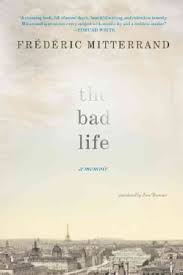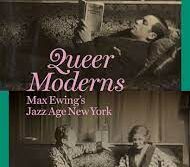 The Bad Life: A Memoir
The Bad Life: A Memoir
by Frédéric Mitterrand
Translated by Jesse Browner
Soft Skull Press. 308 pages, $16.95
THESE DAYS it seems you can write a memoir in one of two ways: tell your story in chronological fashion (what Holden Caulfield called “all that David Copperfield kind of crap”), or discuss, like a man turning over the objects on his desk, various subjects that reveal the story in an oblique way. The Bad Life, a best-selling memoir by Frédéric Mitterrand, the openly gay minister of culture in the government of Nicholas Sarkozy (and nephew of a past president of France, François Mitterrand), belongs to the second.
The book begins, it’s true, with a chapter called “Childhood,” which caused this reader to grit his teeth, only to discover that it’s not about the author’s early years at all; it’s about his adopting, as an adult, two boys from a poor family in Morocco to give them the advantages Mitterrand had as a child in that emblematically posh neighborhood of Paris, the l6th Arrondissement. And so The Bad Life (ably translated by Jesse Browner into a nimble English that mixes high and low, formality and slang) continues in chapters that deal with the nannies to whom Mitterrand attached himself as a child (echoes of Proust’s Françoise); his obsession with the actress Catherine Deneuve (la duchesse de Guermantes); a trip to Greece while in love with a young man whom he calls in retrospect “the ideal partner for the inexorable melodrama of betrayal.” (“One cannot go to more trouble planning one’s own misfortune than I did,” he writes in a sentence that conveys beautifully the book’s tone.) There are also chapters on a friend of his family who murdered his wife, son, and mistress; an old lady whose parcel he carried one day on his way to school; an American filmmaker who didn’t tell him he was dying of AIDS; and a long chapter on his adventures with the rent boys of Bangkok.
It’s the latter who inspire perhaps the best writing in the whole book—we are with him in the bars, hotels, and bedrooms of the Thai capital in a marvelously observed slice of vicarious life that may make you change your mind about visiting the brothel of Europe. The other sections of The Bad Life are for the most part more indirect, private, and mysterious. We aren’t even sure who’s being talked about in some of them, and so, while a confessional tone imbues the entire work—what Ed White aptly calls its “reckless candor” in a blurb—a strange secretiveness keeps the reader at one remove, as if the book-buyer is eavesdropping on someone in the confessional, or reading something meant for other people, not himself.
This paradox of the intimate and aloof may be the protection a self needs when confessing to so much loneliness, angst, and finally self-loathing. “I always have the same sense of amazement,” Mitterrand writes at the end of the chapter on Greece, “when I look at pictures of myself from that time: he was a nice boy, things should have worked out better for him. I will never know why I hated myself so much, to the point of falling in love with someone just like me who wouldn’t love me either, nor why I had to wait until I was on the threshold of old age, when it was far too late, to see that it was a mistake to hate myself so obstinately when I was just as capable as anyone else of finding someone to love me.”
Rue, remorse, and depression run through this book—and a certain coyness. In the final chapter, about a funeral, I was not even sure who was being buried; and if the translator hadn’t identified certain other people in a translator’s note, I’d have been in the dark about them, too. It may be merely that Mitterrand is a well-known television personality in France and some of the characters in this memoir are even more famous than he. But what explains his mysterious use of the second person—“You were walking along happily with your little boy; I was passing on my moped”—for example, in a chapter on an actress who’s never named but is easy to identify as Deneuve from the clues that Mitterrand drops? Whatever the reason—to protect privacy or establish a tone—the effect is at times absurd, unless it is connected somehow to the shyness, the self-loathing, with which the book is imbued.
The Bad Life is full of regret: letters not sent, people not visited, phone calls not made, friends lost track of, reunions that disappoint. Squeamish about illness and death, the author nevertheless climbs a wall to get into the house in which his friend, the novelist Françoise Sagan, lies on her deathbed, and leaves after a short vigil before anyone knows he’s been there: a scene whose secretiveness stands for the whole book somehow. There is a persistent sense of anhedonia in this memoir—an isolation, a loneliness, a homosexual melancholy that explains even the selection of his hotel on a trip to Madrid to visit the wife of an old flame: “In the evening I would return to my hotel, a sort of lugubrious caravansary that I’d chosen among all options with the unerring eye of the depressive.” Among the rent boys of Asia, this morose and mordant mood finds its perfect canvas. In the middle of a sexual encounter that inspires him to think “I’ve never felt more blissful or more powerful,” Mitterrand suddenly catches sight of himself and the hustler he’s hired in a side mirror, which “reflects our image—me as a madman, he as a corpse—and it staggers me.”
“Like a child’s sorrow my shame drifts over his silence and his naked body, envelops his clothes folded neatly atop the television, and finds no words; he wouldn’t understand them anyway. My desire evaporates as fast as the sky train that will bring him home to his festering suburb later tonight, a few bahts in his pockets to spend on useless trinkets.” And, finally, in a line that trembles on the edge of camp and deserves to be a classic: “Thirty years of bad sex have led to this?” (I’ll bet it sounds even better in French.)
The bad sex is not gone into in this memoir; indeed, much of The Bad Life deals with relationships with women—including one he’d have married had he been able to perform heterosexually—and with emotional obsessions. It is also replete with references to queers and fag bars, a disdainful syntax that leaves no doubt about Mitterrand’s alienation from the gay world too. Yet in real life he is a gay activist, an openly gay cabinet member, and the frankness of his account of the brothels of Bangkok is utterly devoid of pretense or prudishness. When he visits a Thai hotel popular with European families who treat him with contempt, he takes pleasure in flaunting the two rent boys he has checked in with, and notes how they have stuck their cell phones into their bathing suits as “an extra dick.”
The Bad Life is an aloof, revealing, defiant, cringing, brave, intelligent, and melancholy book—a bit affected, more often eloquent—in part a portrait of the sort of character Françoise Sagan wrote about (rich brats), in part the vision of a gay man whose loneliness gave him a sharp and wonderful eye, a moral disgust that brings to mind, somehow, the same sour French taste one finds in another accusatory classic, Hervé Guibert’s To the Friend Who Did Not Save My Life (1991).




